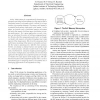Free Online Productivity Tools
i2Speak
i2Symbol
i2OCR
iTex2Img
iWeb2Print
iWeb2Shot
i2Type
iPdf2Split
iPdf2Merge
i2Bopomofo
i2Arabic
i2Style
i2Image
i2PDF
iLatex2Rtf
Sci2ools
119
click to vote
VLSID
2007
IEEE
2007
IEEE
On the Impact of Address Space Assignment on Performance in Systems-on-Chip
Today, VLSI systems for computationally demanding applications are being built as Systems-on-Chip (SoCs) with a distributed memory sub-system which is shared by a large number of processing elements. The memory sub-system is a potential performance bottle-neck in the system. In this paper, we consider such a distributed memory sub-system and study the impact of address space distribution on system performance. For a given application on such a system, we introduce the notion of address assignment quality. We show that this assignment quality metric is strongly correlated with memory sub-system throughput over large regions of the design space. We show this using open loop performance modeling of the memory sub-system, and justify this using a queueing and a Markov chain analysis. Further, we develop a detailed memory sub-system model for a multi-processor simulation system built on the Augmint [14] framework. Using two (highly parallel) applications (matrix multiplication and bubble s...
Computer Architecture | Distributed Memory Sub-system | Memory Sub-system | Memory Sub-system Model | VLSID 2007 |
Related Content
| Added | 30 Nov 2009 |
| Updated | 30 Nov 2009 |
| Type | Conference |
| Year | 2007 |
| Where | VLSID |
| Authors | G. Hazari, Madhav P. Desai, H. Kasture |
Comments (0)

